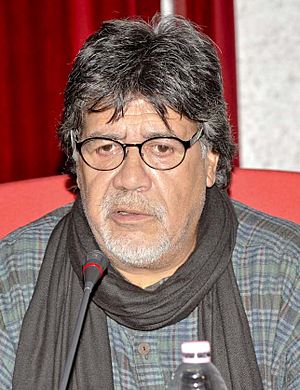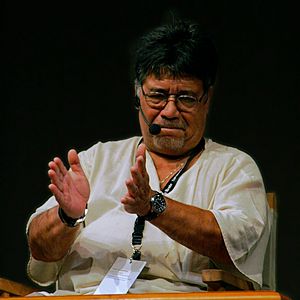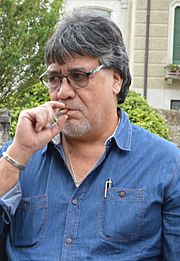Luis Sepúlveda facts for kids
Quick facts for kids
Luis Sepúlveda
|
|
|---|---|

Sepúlveda in 2014
|
|
| Born | October 4, 1949 Ovalle, Limarí Province, Chile
|
| Died | April 16, 2020 (aged 70) Oviedo, Asturias, Spain
|
| Alma mater | University of Chile |
| Occupation | Writer, journalist |
Luis Sepúlveda Calfucura (born October 4, 1949 – died April 16, 2020) was a famous writer and journalist from Chile. He was a strong believer in communism, which is a political idea about how society should be run. He was also a big opponent of Augusto Pinochet's government, which was a military dictatorship in Chile during the 1970s. Because of his beliefs, he was jailed and had a very hard time during that period.
Sepúlveda wrote many books, including poetry and short stories. Besides his native Spanish, he could also speak English, French, and Italian. He became very well-known in the late 1980s with his first novel, The Old Man Who Read Love Novels.
Contents
Early Life and Political Activism
Luis Sepúlveda was born in Ovalle, Limarí Province, Chile in 1949. His father, José Sepúlveda, was active in the Chilean Communist Party. His mother, Irma Calfucura, was a nurse and had Mapuche heritage. After finishing high school in Santiago, he studied theatre production at the National University of Chile.
Luis Sepúlveda was very active in politics. He led student movements and worked for the government of Salvador Allende. There, he helped create cheap editions of classic books for everyone to read. He also helped solve problems between the government and Chilean companies.
Challenges During the Dictatorship
After the Chilean coup of 1973, General Augusto Pinochet took control of the country. Luis Sepúlveda was arrested and spent two and a half years in jail. Later, he was put under house arrest. This happened because of the efforts of Amnesty International, a group that works for human rights.
He managed to escape and hid for almost a year. With help from a friend, he started a drama group in Valparaíso. This group became a secret way for people to resist the new government. However, he was arrested again and sentenced to life in prison. This sentence was later changed to 28 years.
Amnesty International stepped in again. His prison sentence was changed to eight years of exile, meaning he had to leave the country. In 1977, he left Chile for Sweden to teach Spanish literature. But he escaped during a stopover in Buenos Aires and went to Uruguay.
Because the political situations in Argentina and Uruguay were similar to Chile, Sepúlveda traveled to São Paulo in Brazil, and then to Paraguay. He had to leave again because of the government there. Finally, he settled in Quito, Ecuador, staying with his friend Jorge Enrique Adoum. He directed a theatre group and joined a UNESCO trip. This trip studied how colonization affected the Shuar people, an Indigenous group.
Travels and Environmental Work
During his trip, he lived with the Shuar people for seven months. This experience helped him understand that Latin America is a continent with many different cultures and languages. He realized that the political ideas he learned didn't always fit with rural people who depended on nature. He worked closely with Indigenous groups and helped create a plan to teach reading and writing to farmers in the Andes mountains.
In 1979, he joined the Simón Bolívar International Brigade, a group fighting in Nicaragua. After their victory, he became a journalist. A year later, he moved to Europe.
He went to Hamburg, Germany, because he admired German writers. He had learned German while in prison. He worked as a journalist, traveling widely in Latin America and Africa.
In 1982, he started working with Greenpeace, an organization that protects the environment. He was a crew member on their ships until 1987. Later, he helped coordinate different parts of the organization. Even after leaving Greenpeace, he continued his environmental work. For example, he strongly supported protecting the environment in Patagonia, a region he loved and wrote about in his popular books.
Awards and Later Life
In 1988, he won the Tigre Juan Award for his novel Un viejo que leía novelas de amor. In 2009, he won the Premio Primavera de Novela for La sombra de lo que fuimos. He wrote many types of books, including novels, children's books, and travel guides. He also wrote and directed films.
On March 1, 2020, after returning from a conference in Portugal, he was confirmed to have COVID-19. He was the first man in the Asturias region of Spain to be infected. By March 11, his condition was critical. He was in a coma and needed help breathing due to organ failure in an Oviedo hospital. He sadly passed away on April 16 because of the virus.
Books
- Martim o melhor jogador de futebol no mundo (1969; English title: Chronicle of Pedro Nobody)
- Martim e Maria, o mais belo livro de romance (1986; Fear, Life, Death, and other Hallucinations)
- Cuaderno de viaje (1987; Travel Log)
- Mundo del Fin del Mundo (1989; The World at the End of the World)
- Un viejo que leía novelas de amor (1989; The Old Man Who Read Love Stories)
- La frontera extraviada (1994; The Lost Frontier)
- Nombre de torero (1994; The Name of a Bullfighter)
- Al andar se hace el camino se hace el camino al andar (1995; Patagonia Express)
- Historia de una gaviota y del gato que le enseñó a volar (1996; The Story of The Cat Who Taught seagulls To Fly)
- Historias marginales (2000)
- Hot line (2002)
- La locura de Pinochet y otros artículos (2002)
- Cuaderno de viaje
- Diario de un killer sentimental seguido de Yacaré
- Komplot: Primera parte de una antología irresponsable
- Los peores cuentos de los hermanos Grim (with Mario Delgado Aparaín, 2004)
- Patagonia Express (2004)
- La sombra de lo que fuimos (2009; The Shadow Of What We Were)
Filmography
Luis Sepúlveda also worked in film, both as a writer and director.
- Vivir a los 17, 1986 director and writer
- Lucky and Zorba, 1998 writer
- Tierra del fuego, 2000 screenplay
- The Old Man Who Read Love Stories, 2001 writer
- Nowhere, 2002 director and writer
- Corazón verde, 2002 writer
Documentaries
- Eduardo Montes-Bradley. (1999). Harto The Borges [Feature Documentary]. U.S.: Patagonia Film Group, U.S..
See also
 In Spanish: Luis Sepúlveda para niños
In Spanish: Luis Sepúlveda para niños



